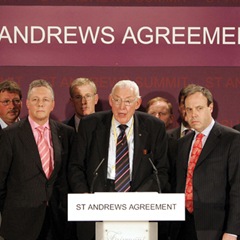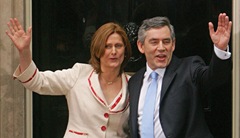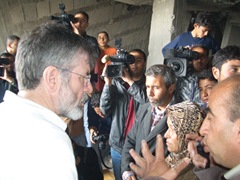A Parliament in review: 2005-2010
 agendaNi takes stock of what the 2005-2010 Parliament meant for Northern Ireland.
agendaNi takes stock of what the 2005-2010 Parliament meant for Northern Ireland.
2005
Arriving at Westminster after the May 2005 poll, the House’s maiden members from the province were Mark Durkan, Alasdair McDonnell, Conor Murphy, David Simpson and Sammy Wilson.
Murphy and the other Sinn Féin MPs started the session on a low note, with their expenses withdrawn after the Northern Bank robbery. Republicans rebuilt their credibility with the IRA’s decommissioning that September.
Energetic and controversial, Peter Hain was introduced to Northern Ireland, soon becoming one of the province’s most forceful secretaries of state.
July had a bright start with Britain
‘winning’ the Olympics and many ordinary voters pushing to ‘make poverty history’ at the G8 Gleneagles summit. Such optimism was dimmed by the return of terrorism to London and the rapid chase to stop more attacks.
Responding to public pressure, Blair sought to increase pre-charge detention for terror suspects from 14 to 90 days but was set back by a rare Commons defeat on 9 November. MPs rejected the plan by 322 votes to 291, opting for 28 days instead. The DUP and SDLP were in opposition with Sylvia Hermon in favour.
DUP support, otherwise to be expected, was probably withheld in protest at the Government’s plans to grant an amnesty to on-the-run paramilitaries. Hain brought this forward to deal with the inconsistency of pursuing on-the-runs while most paramilitary prisoners had already been released.
In an emotive second reading on 23 November, the Northern Ireland (Offences) Bill was condemned as “offensive and nauseating” by Nigel Dodds.
Kate Hoey reminded the House that the people of Northern Ireland “are members of the human race” while Frank Field suggested the plan put out “conflicting messages” about how local and Islamic terrorists were treated. The Commons divided between 310 ayes and 262 noes.
Sinn Féin was the only local party in favour of the plan but dropped its support in December when it became clear that security force members would also be pardoned.
2005 also saw the appearance of David Cameron as the Tories’ new leader as the year ended, a development which at first seemed to have little relevance to Northern Ireland.
2006
Of course the young Conservative leader would go on to have at least a slight bearing on the situation in Northern Ireland, but in 2006 his concentration was very much on his opposite number.
An about turn on the on-the-runs Bill came on 11 January. Peter Hain told the House that once Sinn Féin had rejected it, there was “no point” in carrying it on.
On 31 January Tony Blair was hit by two defeats in one day. The Racial and Religious Hatred Bill, which was firstly opposed by comics and satirists, came up against opposition in the House of Lords.
The upper chamber’s amendments were not, as is usually the case, overturned by the Commons. Blair faced a defeat of 288 votes to 278. Later that day in a second vote, the Government was again defeated, this time by one solitary vote (283 to 282); Blair himself was not present. All 10 unionist MPs, along with Mark Durkan, voted against the Government. The Bill eventually passed on 16 February, complete with the Lords’ changes.
February saw the return of Sinn Féin’s allowances at Westminster. An IMC report, which stated that the IRA had kept its word on decommissioning, satisfied the Secretary of State that he could lift the suspension on the party. In the debate on 8 February, Nigel Dodds asked the PM how the decision could be justified. Blair said that his government was acting in a “fair and balanced way”.
Conor Murphy stated at the time that his party was entitled to the money: “The allowances that are afforded to people [aren’t] dependent on anyone sitting at Westminster.”
A breakthrough in the peace process came when the Irish and UK Governments met with Northern Ireland parties at St Andrews between 11-13 October. Parties were given until 10 November to accept the resulting agreement in principle and until 24 November to accept it entirely. Those dates were pushed forward to allow for the Sinn Féin ard fheis to take place the following January, where republicans would agree to accept policing in the province.
Blair, by this stage seemed to have had enough. It is popularly accepted now that he was seeking a last hurrah and Northern Ireland could provide that.
On 28 January, Sinn Féin accepted policing. Talks between January and May
were geared towards continuing the progress made at St Andrews; Downing Street guessed that Blair spoke personally to Ian Paisley 20 times, and Gerry Adams even more.
A deadline had been set for a government to be set up in Northern Ireland before midnight on 26 March and duly elections took place on 7 March. Following the DUP- Sinn Féin deal on deadline day, devolution arrived in Northern Ireland on 8 May.
Blair was present on the hill that day, saying it was “a very important day for the people of Northern Ireland, but also for the people and the history of these islands”.
While the province continued to have 18 MPs, five of which did not take their seats, the vast majority of Northern Ireland policy was transferred to Stormont, with the notable exception of policing and justice.
The PM changeover was also not long in coming. On 27 June Blair appeared at his last Prime Minister’s Questions, receiving an ovation from all sides of the House, before leaving charge of the country to Gordon Brown.
A reshuffle on 28 June saw Peter Hain moved on to work and pensions, and the Sainsbury’s heir apparent Shaun Woodward taking his place at Hillsborough Castle.
As the province generally enjoyed something of a honeymoon period, the Irish language remained a sticking point. On 16 October then Culture Minister Edwin Poots announced there would be no Irish Language Act. Sinn Féin, pointing to the commitment in the St Andrews Agreement, called on the UK Government to fulfil the pledge. That idea was considered by the Government but any such law would still require the Assembly’s consent.
2008
Gordon Brown’s first full year in office was marked by turmoil over his leadership and a global financial storm which thoroughly shook the UK and Irish economies. It brought the PM to the brink of political disaster but he survived thanks to his economic steering.
The run on Northern Rock, which had little local impact, foretold the economic crisis that would escalate throughout the year, leading to the £37 billion bail-out in October. One unintended consequence was another run, this time on the Presbyterian Mutual Society, after many savers moved their money to safer bank accounts.
Brown’s decision as Chancellor to drop the 10p tax rate came back to haunt him in April. Raising the income tax of 5.3 million people into the 20 per cent band proved deeply unpopular with Labour backbenchers and local MPs. A £2.7 billion compensation package for those affected helped avoid a damaging rebellion.
His troubles did not end there. The Government tried to extend pre-charge detention for terrorism to 42 days but civil liberties groups and mainland opposition parties protested strongly. The SDLP and, outside the Commons, Sinn Féin opposed the move while unionists remained to be persuaded.
Secretive talks between the DUP and Labour led up to the debate which went to the wire on 11 June. Nine votes – all Democratic Unionist – clinched the vote for the Government. Sylvia Hermon also voted with Labour.
As the PM had staked so much on that, it is highly likely he would have left office if defeated.
Relations between the Tories and DUP soured, especially after Iris Robinson held up nine fingers straight afterwards. “We decided on an issue of principle on national security,” declared Willie
McCrea, although he would not object to extra money going to the province.
Sceptical lords dissented and went on to overturn the plans on 13 October. The Government then dropped the proposal.
Northern Ireland rose to prominence in Westminster circles when the UUP-Tory pact was unveiled over the summer. Cameron would later address Ulster Unionists at their conference in December.
After DUP, UUP and SDLP MPs voted to restrict abortion in Britain, Labour’s Diane Abbott led a campaign to liberalise the law in Northern Ireland. All the main local parties strongly protested and the amendment was shelved on 22 October, when the Commons ran out of time to debate it.
The first terrorist murder of soldiers in over a decade took place on 7 March when two soldiers were shot dead by the Real IRA outside Massereene army base in Antrim. Two days later Catholic policeman Stephen Carroll was shot dead in Craigavon by the Continuity IRA.
Gordon Brown condemned the killings as “cowardly” and Gerry Adams called the Massereene attack “wrong and counter- productive.”
In April, Brown suffered a shock defeat in the House of Commons when Labour were outvoted 267 to 246 over a Liberal Democrat motion offering all Gurkhas equal rights of residence, as opposed to previous legislation which only allowed right of abode to those who had retired after 1997. The Tories, 27 Labour rebels and all present local MPs voted for the motion following a high profile campaign in support of the Nepalese troops who had fought for Britain in the British Indian army and in both world wars.
This was followed swiftly by the expenses scandal which shook Brown’s government to the core and resulted in the resignation of the Commons Speaker along with announcements from around 20 Labour and Conservative MPs that they would step down at the general election.
Brown and Cameron both apologised to the public and the Independent Parliamentary Standards Authority was established. It has formulated new rules for MPs expenses which will come into force immediately after the general election. Ten Northern Ireland MPs had to pay back expenses.
The day after the European elections, amid rumours of plots and coups within Downing Street to oust the PM, Brown was taken aback by the resignation of Work and Pensions Secretary James Purnell, who told him to stand aside so that Labour would have a fighting chance at winning the next election.
In June Brown brought the forthcoming election into the spotlight by launching his ‘Building Britain’s Future’ policy programme. agendaNi was later the first to report that local parties would consider taking part in live TV debates like Brown, Cameron and Clegg. Irish unity was discussed at Westminster in July when Gerry Adams made a visit.
The Queen’s speech in November reaffirmed the Government’s commitment to the peace process and its desire to devolve policing and justice. A Financial Services Bill was announced to provide more effective regulation of the banking system.
Iris Robinson announced in December that she would stand down as an MLA due to a battle with depression. Further revelations about her conduct came early in 2010.
Robinson resigned as MP for Strangford following a BBC Spotlight investigation which alleged that she had an affair with a 19-year-old to whom she had given money for his café , without making a declaration of interest in the business or the donations she received from businessmen.
Gerry Adams faced controversy when news broke that he had not reported alleged child abuse by his brother to the police and allowed him to remain as an active member of Sinn Féin Belfast.
Dissident activity in the province continued to increase and devolving policing and justice was the main issue on the agenda.
After much anticipation and despite the UUP’s absence, the Hillsborough Agreement was reached on 5 February. Brown stated: “The completion of devolution, supported by all sections of the community in Northern Ireland, is the final end to decades of strife.”
As anticipated, Brown made his way to Buckingham Palace on 6 May to request that Parliament be dissolved and called the general election.
In April the Alliance leader David Ford was selected as Northern Ireland’s new Justice Minister, becoming the first local politician to take responsibility for justice and policing in 38 years.
Relatives of those killed on Bloody Sunday were disappointed and angry to hear that after 12 years, the inquiry report by Lord Saville would not be released to the families before the election. Instead it is being read by Shaun Woodward’s officials and is to be released after the general election.
The Omagh bombing was put back on the agenda of the Northern Ireland Affairs Committee.” Members criticised the Government for not clarifying whether it agrees with the committee’s recommendation that a new inquiry should be carried out. The committee believes that its Chairman should have been allowed to read the full report on intercept intelligence relating to the events on 15 August 1998, but this was refused. They called on whoever chairs the committee after the general election to take up the issue.
In summary
The story of a parliament is usually that of its government although MPs have at times asserted the will of the House. Votes on 90- day detention, the Gurkhas and freedom of speech all went against the Government’s wishes, showing that Parliament does occasionally have power of its own.
However, made up as it was of 646 MPs, Parliament was usually the weaker of the two. The Government was especially successful in getting its peace process laws through the Commons, sometimes with controversy and at other times with a broad welcome.
Due to some MPs’ abuses, the Commons’ reputation is now weaker but the election allows for a fresh start. Devolution means Parliament now has less relevance to our everyday lives than in 2005 but nonetheless the major decisions MPs take on our tax, security, broadcasting and pensions and others will still have a bearing on the lives of everyone in Northern Ireland.








